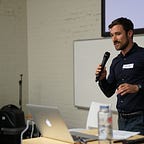Transformations Conference 2023 — Transformative Partnerships for a Better World: a short blog Post
This short blog is an attempt to share some ideas, resources and people who are leading transformative change. This is only the tip of the iceberg of what was covered at the conference, but here are highlights to friends and colleagues, including this video bank of keynotes and short sessions.
A huge thank you to the @Tranasformations Community for designing, weaving and convening a rich tapestry of people, ideas and learning journeys; hosted by @UTS in Sydney and connected to online hubs across the world. And Whonova, for providing an excellent hybrid platform.
Some highlights from sessions I attended below:
- Backcasting for transformative adaptation in the Anthropocene with Sophie Guillain, Tom Van de Boron and Richard Blume. We heard about how teams in Scotland and France who used transformative scenario development, using climate science and climate fiction to tell stories about the future that prompts the social imagination and collective intelligence.
- Regional Transformation and the Just Transition with Amanda Cahill, John Wiseman, Wendy Farmer, Kimberley Croft, Gareth Edwards, and Naomi Carrard, speaking about Voices of the Valley, Hunter Renewal and the Next Economy. As I am working on a regional transition project in Gladstone, this session was of particular interest — some key lessons:
- Any just transition plan needs to be defined and developed in a particular context because each place, economic history and societal future is different.
- An energy and climate transition should include a clear narrative, vision and plan for a preferred future that speaks to how a transition will improve the lives and conditions for regional economies, people and business.
- We need a diverse coalition of people, industry and government to work together; and for community to be part of the planning conversation about their future.
- That transition implies change, and with change comes unintended consequences and complex dynamics. For example, if we were to stop exporting coal, then we need to understand the impact of this on India and countries who rely on cheap energy; and how to accelerate affordable, clean energy for less wealthy countries. We need to plan across multiple systems with a complexity and learning mindset.
- Funding is only part of the answer. Building economic resilience, economic diversification, low-carbon manufacturing and production, is all part of enabling funds to become productive.
3. A T Practice session: A practice session exploring systems mapping through a transition lens, with Victoria Shaw and Paloma Bernal-Hernandez. We were introduced to the Transformative Innovation Policy Resource Lab, an open source platform of theories, methods and practice for policy innovation. Related to this is Climate-KIC EU’s (the sister organisation to Climate-KIC Australia) Visual Toolbox for Systems Innovation.
4. Engaging in new narratives for a Transformed Future, with Marcelle Holloway who shared a paper and case study of using Causal Layered Analysis in understanding different community views on gas fracking. The CLA model, developed by Sohail Inayatullah, can be used to understand different levels of meaning making that people engage with when taking positions or articulating views; and that can be used to generate new narratives. Marcelle helped me apply the model, leading us to use it as a sense-making tool in the context of the energy and climate transition. I found the tool a powerful way to diffuse polarisation as it opens up dialogue in relation to how reasonable minds will differ in how we respond to complex challenges.
5. Inner Development Goals: evolving our transformative capabilities, with Ben Le Hunte, Vivianna Rodriguez Carreon, and Vivien Sung and Jax Wechsler. This movement recognises that we can’t only transform our external systems, but need to mature, grow and develop our inner capacities. I have been following some key people in this, such as Thomas Bjorkman and Lene Rachel Anderson, and am so excited by the idea that part of our collective response is cultural evolution and maturity. That while we need technological and policy solutions, a lot of what society and people need is fulfilment, social intelligence and human development, that can be unlocked by inner development and education.
Some big reflections from convenors as we were wrapping up the
- Transformation means a transition in systems, which requires hosting conversations in relation to politics, power and possibility.
- That we are in the midst of societal change, and we need to shift from only setting targets to showing how we design, make and implement change.
- That a change in systems will create uncertainty, and this can be a place where dissent and conspiracy theories thrive. We need a community who can navigate uncertainty, communicate with clarity, and innovate in this context.
- A safe corridor of development for 10 billion people requires us to engage not only the socio-technical, but the social-cultural aspects of change, too.
Thanks again, Transformers.
Kim Shore
